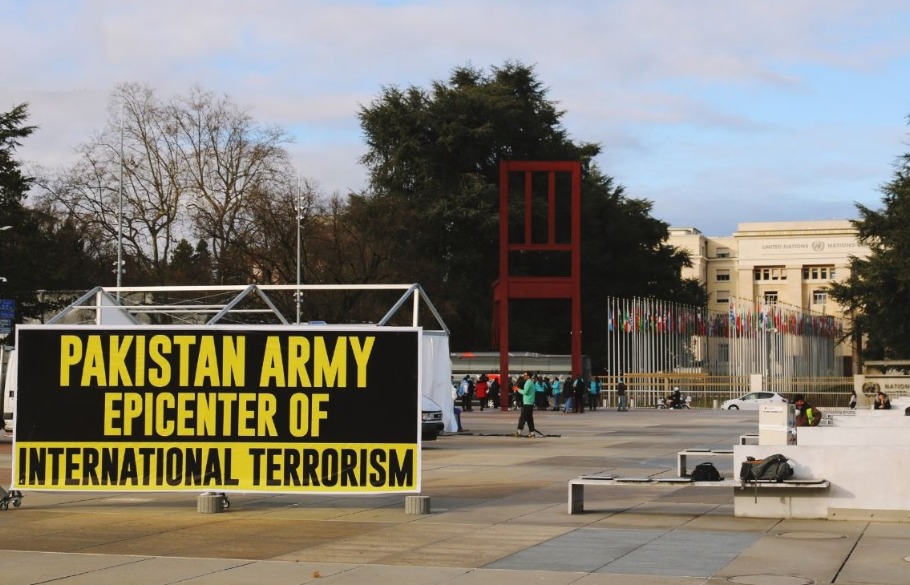
Pak minorities brand army as epicentre of terrorism, protest outside UN office
In a protest staged by the minorities from Pakistan, posters reading “Pakistan Army epicentre of international terrorism” were put up outside the United Nations Human Rights Council.

Demanding stern action against their own country for allegedly assisting terror activities, minorities of Pakistan staged a protest on Saturday (February 29) outside the United Nations Human Rights Council (UNHCR) in Geneva, Switzerland, where the 43rd session of the council was held.
Posters reading “Pakistan Army epicentre of international terrorism” were put up at the venue of the agitation. Protesters said that Pakistan is a threat to world security and human safety.
They also claimed that their government has been actively engaged in terror-inflicting activities within the area and beyond by vigorously sponsoring several outfits.
The protesters also pointed to the unregulated financial structure of Pakistan that paves the way for the irregular transfer of money which feeds terrorism in the country.
“The terrorists in Pakistan are able to organise, plan, raise funds, and operate easily in the country because of the lack of governance and political will to address the problem,” they said in Geneva.
According to a statement issued by an NGO in Geneva, the region bordering Afghanistan is a hub for terrorist groups such as Al-Qaeda and Taliban.
Related news: QUAD to be revived to fight terrorism; works on with Pakistan: Trump
“Since 9/11, Pakistan has been the epicentre of International Terrorism. The region of North Waziristan which borders Afghanistan used to be a hub of local and international terrorists linked to groups, including Al-Qaeda and Taliban as well as other terrorist networks,” reported NDTV, quoting the NGO.
Related news: Afghans mark start of week-long partial truce amid isolated attacks
Even as several measures are being taken by other countries to fight terrorism on a global scale, according to the protesters, Pakistan government is not willing to solve this issue because of its involvement in illegal activities.
Related news: Pakistan stays on terror funding Grey List, FATF warns of stern action
The minorities have urged the UN to reprimand Pakistan and take necessary action to stop it from encouraging terror with immediate effect and establish rule of law in the region.
According to ANI, a protest will be staged by Baloch and Pashtun activists in front of the UN office against the involvement of the Pakistani military establishment in breeding terror outfits.
The protest comes after India on Friday (February 29) asked Pakistan to stop terror funding and destroy terrorist camps operating from its soil and territories under its control, while publicly denouncing Islamabad’s efforts to curb the positive developments in Jammu and Kashmir.
Earlier last week, the global terror financing watchdog Financial Action Task Force (FATF) in Paris decided to retain Pakistan in its ‘Grey List’ and warned the country of stern action if it fails to prosecute and penalise those involved in terror funding emanating from its jurisdiction.
Related news: Not meeting FATF obligations would be devastating for Pak: US
India, in its statement, also pointed at the plight of minorities in Muslim-majority Pakistan, asking the country’s top leadership to end harassment and execution of minorities through misuse of the blasphemy law, end forced conversions and marriages of women and girls from Hindu, Sikh, and Christian religions and stop religious persecution against Shias, Ahmadiyas, Ismailia and Hazaras.
This year’s United Nations session in Geneva, which is scheduled to end on March 20, will have a high-level panel discussion on “Thirty years of implementation of the convention on the rights of the child: Challenges and opportunities,” which aims to assess the members to progress towards human rights goals.
In view of the Pakistan government’s inability to curb terrorism and protect basic human rights of minorities, activists, women and children from the extremist, terrorist, criminal and conservative sections in the country, various other symbolic protests have been planned so as to urge the UN to take stringent action against the Army.

